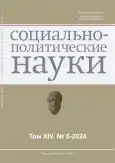Некоторые подходы США к кибернетическому сдерживанию
- Авторы: Копылов А.В.1, Лихоносов А.Г.1, Чичулин Н.А.1
-
Учреждения:
- Университет мировых цивилизаций имени В.В. Жириновского
- Выпуск: Том 14, № 5 (2024)
- Страницы: 15-23
- Раздел: История и теория политики
- URL: https://bakhtiniada.ru/2223-0092/article/view/282473
- DOI: https://doi.org/10.33693/2223-0092-2024-14-5-15-23
- EDN: https://elibrary.ru/QUPCMI
- ID: 282473
Цитировать
Аннотация
Интенсивное развитие информационно-коммуникационных технологий, цифровизация всех сфер общественной жизни создают не только условия для прогрессивного развития человечества, но и сопровождаются возникновением новых угроз в кибернетическом пространстве. В условиях небывалого научно-технического прогресса стремительно растут информационные потоки, одновременно увеличивается число вредоносных кибератак на информационную инфраструктуру стран. Для предотвращения и борьбы с кибернетическими угрозами некоторые государства обращаются к теории и практике концепции сдерживания. В статье исследуются подходы Соединенных Штатов к сдерживанию в кибернетическом пространстве. Авторами проанализирован понятийный аппарат, при этом кибернетическое пространство и информационное пространство рассматриваются как часть и целое. На основе анализа положений руководящих документов США по стратегическому планированию исследуется эволюция взглядов американской администрации на сдерживание в кибернетическом пространстве. Сделан вывод о том, что киберсдерживание стало одним из приоритетных направлений в оборонной политике США, в его основе лежит, комплексное использование всех инструментов государственной мощи (дипломатических, информационных, военных, экономических, финансовых, разведывательных, правовых), проведение наступательных киберопераций не только в военное, но и в мирное время, развитие междоменного сотрудничества с союзниками и партнерами, применение новых технологий искусственного интеллекта и квантовых вычислений. Исследованы концептуальные подходы американских ученых к проведению операций сдерживания в киберпространстве на различных этапах развития военного конфликта и применению публичной атрибуции кибератак. Рассмотрено влияние кибернетического сдерживания на международную информационную безопасность, национальную безопасность России.
Полный текст
Открыть статью на сайте журналаОб авторах
Александр Валентинович Копылов
Университет мировых цивилизаций имени В.В. Жириновского
Автор, ответственный за переписку.
Email: shashike@mail.ru
SPIN-код: 4262-3230
доктор политических наук, профессор; ведущий научный сотрудник
Россия, г. МоскваАлександр Геронтьевич Лихоносов
Университет мировых цивилизаций имени В.В. Жириновского
Email: lihonosov1968@mail.ru
SPIN-код: 8065-7770
доктор политических наук, профессор; ведущий научный сотрудник
Россия, г. МоскваНиколай Александрович Чичулин
Университет мировых цивилизаций имени В.В. Жириновского
Email: nikolay.chichulin@yandex.ru
SPIN-код: 1798-9099
доктор политических наук, профессор; ведущий научный сотрудник
Россия, г. МоскваСписок литературы
- Дылевский И.Н., Базылев С.И., Запивахин С.А. и др. О взглядах администрации США на киберпространство как новую сферу ведения военных действий // Военная мысль. 2020. № 10. С. 22–29.
- Евгеньев Д.Н., Маккона С.А. Анализ программ создания кибероружия в вооруженных силах США // Научная мысль. 2023. Т. 23. № 1, 2-1 (47). С. 77–85.
- Коротков А.Г., Гаврилов М.В., Короткова Н.К. Кибероружие как приоритетное средство вооруженной борьбы будущего // Проблемы повышения эффективности научной работы в оборонно-промышленном комплексе России: матер. VI Всерос. науч.-практ. конф. / сост. С.Н. Бориско. Астрахань, 2023. С. 184–187.
- Марков А.С., Ромашкина Н.П. Проблема выявления источника (атрибуции) кибератак – фактор международной безопасности // Мировая экономика и международные отношения. 2022. Т. 6. № 12. С. 58–68.
- Новосельский С.О., Ксенофонтова К.М., Золкин А.Л. и др. Анализ и последствия интеллектуальной эмиграции для экономики страны в условиях кризиса // Евразийский Союз: вопросы международных отношений. 2023. Т. 12. № 6 (52). С. 680–692.
- Шакиров О.И. Кто придет с кибермечом: подходы России и США к сдерживанию в киберпространстве // Международная аналитика. 2020. № 4. С. 149–150.
- McKenzie T.M. Is cyber deterrence possible? Perspectives on cyber power. Maxwell AFB, AL: Air University Press, 2017.
Дополнительные файлы









